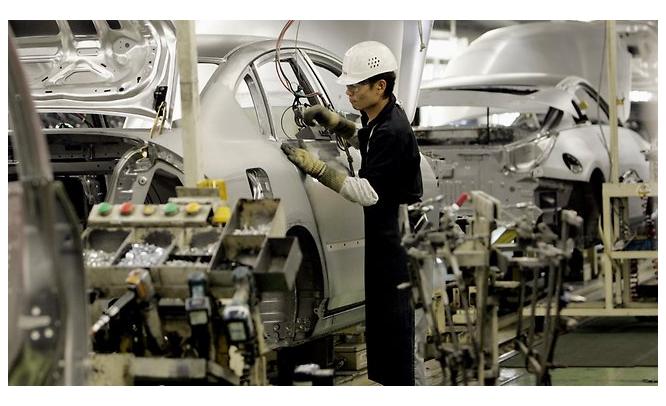Spurt in activity comes on heels of weak February data, and independent economy tracker says April too will bring bad news, reports Team IFM
Tokyo, May 19: Japan saw its industrial production rev up as expected in March on the eve of a sales levy hike, according to official data released on Friday, while an independent analysis showed this rebound was short-lived with factory output plummeting in April.
The data of the Ministry of Economy, Trade and Industry (METI), which has goaded some analysts to comment that the world’s third largest economy was on way to an economic recovery, came within days of an official survey report that said people on the lower tiers of the income ladder were downbeat after being hit by the tax raise.
Friday’s METI data said industrial production recorded an upswing of 0.7 percent in the final reading in March, higher than the preliminary report issued on April 30.
The ministry said this upgrade was partly on account of additional information furnished by general machinery and fabricated metal makers that was not reflected in the earlier report.
The March show was actually commendable following an unexpected plunge of 2.3 percent in industrial output the month before, as compared to January production. This nosedive, the sharpest in eight months, went the opposite way of a median estimate of 28 economists, who had predicted a 0.3 percent gain.
February’s fall was attributed to disruptions due to heavy snowfall, but analysts also pointed to April’s three percentage-point increase in sales tax. Manufacturers started gearing up for a decline in demand, which led to inventories shrinking for the seventh month in succession.
Seen against this backdrop, the METI data for March points to a rosier future. However, according to economy tracker Markit, factory output tumbled to the greatest extent in April since last December, and new orders deteriorated for the first time in 14 months.
“As was expected, the implementation of the increase in the sales tax negatively impacted on Japanese manufacturing companies,” said Amy Brownbill, the Markit economist who authored the survey report.
MARCH UP
Revised METI estimates showed a month-over-month industrial production growth of 0.7 percent in March, as compared to 0.3 percent the preceding month. The data prompted Prime Minister Shinzo Abe to assert Japan would reach the 2 percent inflation target, and promised more policy steps and stimulus packages to prop the economy if needed.
Earlier, METI had pegged the March industrial production growth at 0.3 percent. The final reading reflected a turnaround from the 2.3 percent drop recorded for February.
Year-on-year on a seasonally unadjusted basis, industrial output increased 7.4 percent in the month under review, compared with a 7.0 percent rise in March 2013. The index of output at factories and mines came to 102.2 against the base of 100 for 2010.
Shipments fell a seasonally adjusted 0.2 percent month-over-month and were upwardly revised from the preliminary reading, which represented a drop of 1.2 percent. Annually, shipments were 6.5 percent higher.
Inventories rose a seasonally adjusted 1.4 percent month-over-month, while the preliminary reading was of a 1.8 percent increase. Year-on-year, it fell 1.4 percent.
March output capacity was at 96.1 percent, same as that in the previous month. Transport equipment production saw month-over-month increases followed by information and communication, electronic equipment, electronic parts and devices and iron and steel.
Meanwhile, the Japanese economy grew more than estimated in the first quarter, mainly driven by the new sales tax hike plan that kicked off on April 1. The economic growth is expected to contract at an annualized 3.5 percent in the second quarter because of the levy increase, before rebounding to a 2.1 percent growth in the third, said Bloomberg.
Japan’s GDP jumped to 5.9 percent in the first quarter, much above analysts’ forecast of 4.2 percent.
APRIL TUMBLES
In April, manufacturers saw output and new orders declining, both falling for the first time in 14 months. In both cases, firms linked the reductions to the rise in the sales tax.
Alongside, the month also saw the highest rate of growth in payroll numbers since February 2007. Both prices charged and input prices rose in April, with selling prices increasing marginally following a decline in March.
Markit’s manufacturing PM posted at 49.4 in April, down from 53.9 in March. “This was the first time in 14 months that the Japanese manufacturing sector saw deterioration in business conditions,” Markit said. “Output fell to the greatest extent seen since December 2012.”
The main contributor according to anecdotal evidence was a decline in demand. Indeed, similar to output, new orders decreased, with evidence suggesting the increase in the sales tax was the main factor behind lower new orders, as clients had brought forward purchases in March to avoid paying additional costs the following month.
Alongside, new export business also fell. “The rate of decline was marginal in April, but nonetheless the first reduction recorded in eight months. Solid decline in work outstanding was observed,” Markit said.
Buying capacity declined sharply in April and at the fastest pace since December 2012. Firms commented on a decrease in purchasing activity because of a drop in new orders.
In contrast to the majority of the indexes, Japanese manufacturers saw employment growth for the ninth month running. Moreover, the rate of job creation quickened to the sharpest since February 2007 as companies took on extra staff in anticipation of future workload growth.
“Output and new orders both fell for the first time in 14 months,” said Markit economist Brownbill. “In both cases, Japanese manufacturing companies linked the reductions to the increase in the sales tax.”
Brownbill referred to payroll numbers that increased at a faster rate than in March and was the sharpest since February 2007.
“It will be interesting to see whether the increase in the sales tax will continue to have a negative impact on Japanese manufacturing activity in the future months or whether the effects will only be short lived,” she said.

